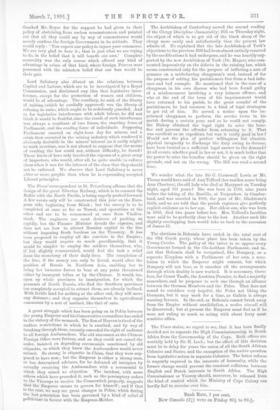Lord Salisbury also dilated on the relations between Capital and
Labour, which are to be investigated by a Royal Commission, and disclaimed any idea that legislative inter- ference, except for the protection of women and children, would be of advantage. The corollary, he said, of the liberty of uniting (which he cordially approved) was the liberty of refusing to unite, which ought to be sedulously guarded. And as for legislative interference with adult labour, he did not think it would be fruitful, since the result of such interference was always a resultant of two forces, the enacting force of Parliament, and the evading force of individuals. Supposing Parliament enacted an eight-hour day for miners, and a crisis then occurred in the mining industry which rendered it obviously desirable in the miners' interest (as it easily might) to work overtime, was it not absurd to suppose that the means -of evading the law could not, without difficulty, be found P These kinds of laws only involved the expense of a great army -of inspectors, who would, after all, be quite unable to enforce them when it was for the interest of the class that they should not be enforced. We observe that Lord Salisbury is never abler or more graphic than when he is expounding accepted Liberal principles.






































 Previous page
Previous page